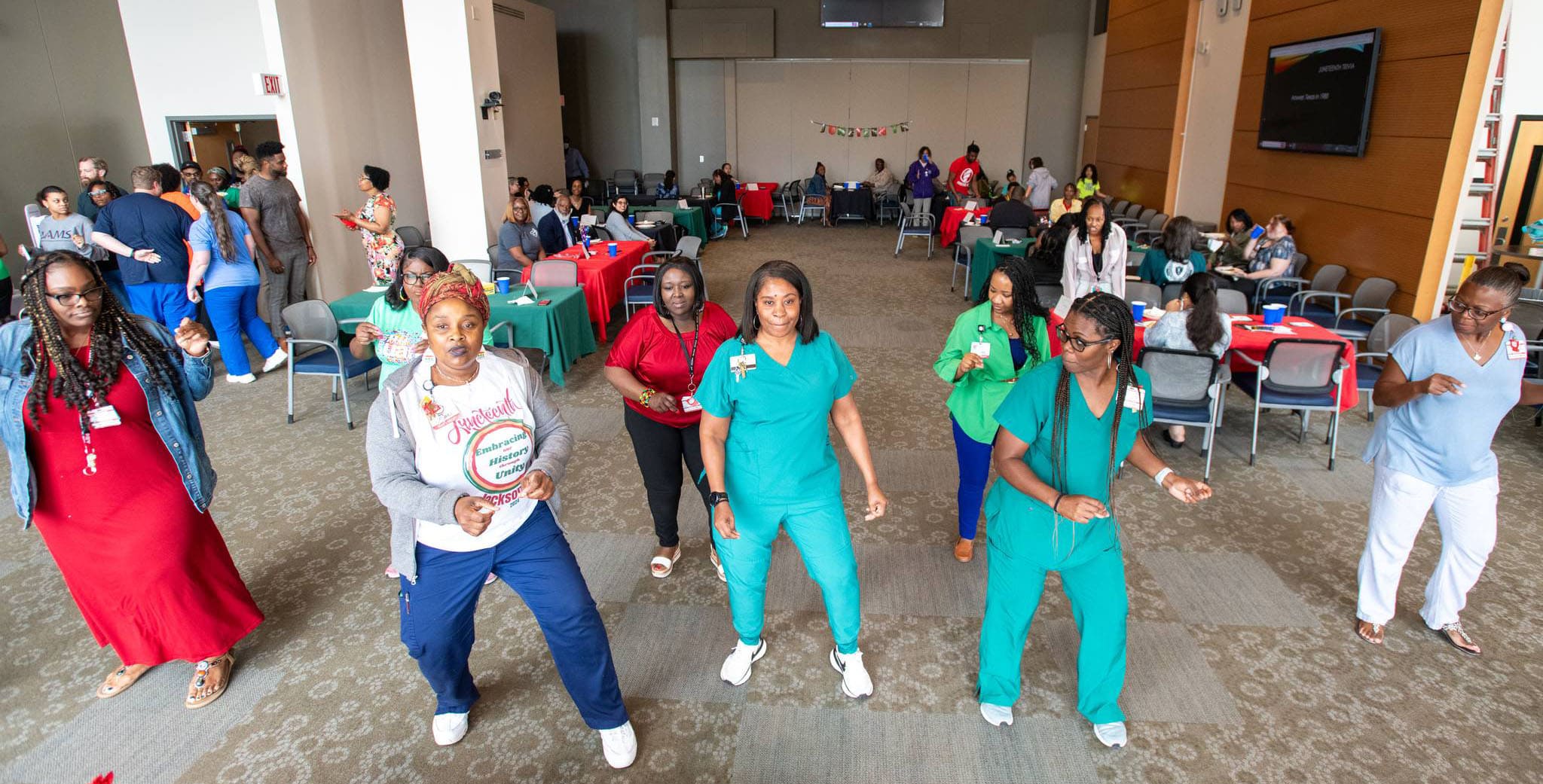UAMS Hosts Annual Juneteenth Celebration
| The song “Wobble” blasted out of the speakers of the University of Arkansas for Medical Sciences (UAMS) Hospital Lobby Gallery during the 2024 Juneteenth recognition, as two lines of people did the wobble line-dance.
Once the song went off, the beat of the next song began. Instantly, laughter exploded inside the room. Seconds earlier, close to 30 people were up dancing. However, that number was now reduced to about 10 people.
But why?
Tamia’s “Can’t Get Enough of You” was now playing. The R&B record is a staple of African American cookouts and gatherings. Also, it has an accompanying line dance that’s known for its extreme difficulty.
Thus, several of the people who were dancing, laughed while admitting their inability to do the Tamia line dance, returning to their table where they enjoyed a meal of barbecue, potato salad, baked beans, lemonade, tea and other fixings.
Meanwhile, a few others went to the Juneteenth photo area to snap a selfie or take a picture with their co-workers.
“It brought me great joy seeing all of the excitement,” said Odette Woods, senior director of the UAMS Division for Academic Pathways and Workforce Partnerships. “The way the campus culture has grown to be more inclusive brings joy to my heart.”
Juneteenth commemorates when Union soldiers arrived in Galveston, Texas, to inform people who were enslaved that the Emancipation Proclamation had went into effect Jan. 1, 1863. The soldiers went to plantations throughout the South to spread the news. However, they didn’t reach Galveston until June 19, 1865.
Many years later in Black communities across the country, Juneteenth became an annual celebration. Due primarily to it becoming a federal holiday in 2021, the day is now recognized by more Americans.
For Brian Gittens, Ed.D., vice chancellor of Academic Pathways and Workforce Partnerships, UAMS presenting a Juneteenth celebration is an ideal way to participate and pay homage to a special occasion.
“We wanted people to pause, come together and celebrate Juneteenth regardless of race or ethnicity as this recognizes a momentous occasion in American history,” he said. “This Juneteenth event brings people together while recognizing an important aspect of our nation’s development.”
Dancing, eating barbecue, listening to classic tunes from Maze featuring Frankie Beverly, Cameo, The Gap Band and New Edition were just part of the celebration.
Games such as Uno, dominoes and Spades were also included.
“Those kinds of games, activities are important,” Gittens said. “When you think about African American culture, those are cultural mainstays at the cookouts, at the barbecues. Therefore, they aligned with our event.”
Organizers also provided an educational aspect to the gathering.
For example, every table had either a red, black or green covering — all colors that have significant meaning in Black culture.
Red represents the blood that unites and was shed by Black people worldwide. The black represents Black people. Meanwhile, the green represents the vast number of natural resources, fertility and wealth in Africa.
Attendees also participated in a Juneteenth Trivia game. Every few minutes, the music would pause as a member of the event’s organizing committee would get on the microphone and ask attendees trivia questions about Juneteenth. Additionally, organizers played a Juneteenth history video and attendees sang “Lift Every Voice and Sing.”
“I enjoyed the camaraderie of it all,” said Karen Bolden, finance manager for the UAMS College of Medicine. “It united people from different departments for history lessons, fellowship, food, music and games. I had an excellent time.”
Reid Landes, Ph.D, professor in the UAMS Department of Biostatistics, came to the Juneteenth celebration with a particular goal in mind.
“I wanted to speak with people and hear their memories and thoughts about Juneteenth — because I don’t have any of my own,” he said. “I wanted to learn about it. I didn’t know anything about Juneteenth until a few years ago. I’m now realizing how, for many years, I’ve missed out on something important.”
“I’m glad I came,” Landes said. “I’m also happy that it’s receiving attention nationwide as a higher number of people are now aware of it and learning about its important place in American history.”
The division’s engagement committee aimed for the celebration to replicate the traditional Black family cookout. They accomplished their goal, Woods said.
“It was simply a time to get together and celebrate that slavery ended in the United States,” she said. “It was all about fellowship and making it easy for us to come together, learn history and have a good time.”
